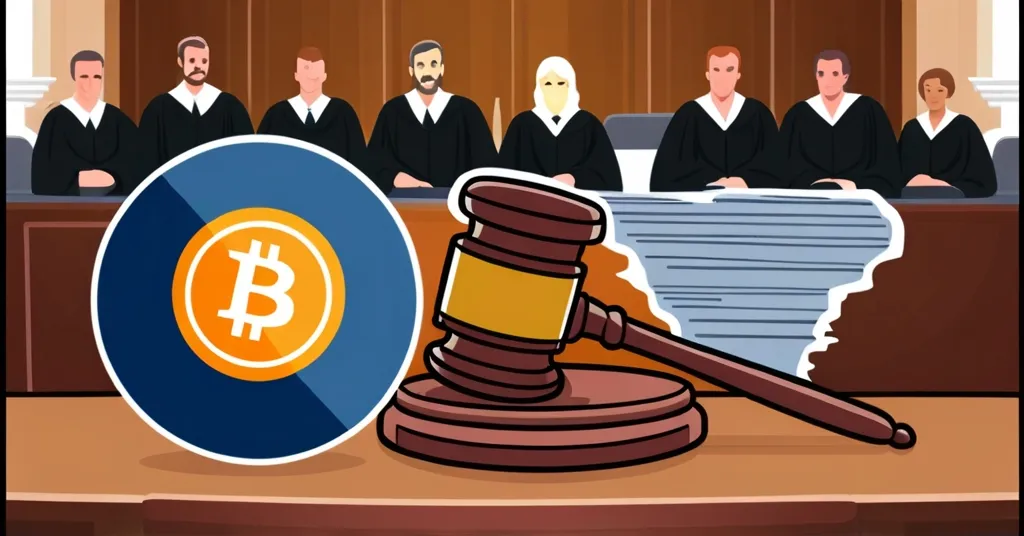Coinbase Wins Lawsuit Against Bit Global, Highlights Justin Sun Risks

Coinbase Triumphs in Court Over Bit Global, Labels Justin Sun a Risk
In a significant legal victory, Coinbase successfully defended itself against a lawsuit from Bit Global, a company associated with the controversial crypto figure Justin Sun, concerning the delisting of Wrapped Bitcoin (wBTC).
- Coinbase delists wBTC due to ties with Justin Sun
- Court dismisses Bit Global’s lawsuit against Coinbase
- Coinbase launches cbBTC amidst legal dispute
In November 2024, Coinbase took the bold step to delist Wrapped Bitcoin (wBTC), a token that represents Bitcoin on other blockchains, allowing it to be used within those ecosystems. The decision was driven by concerns about wBTC’s association with Justin Sun, a figure who has caused significant debate and issues within the crypto community. Paul Grewal, Coinbase’s Chief Legal Officer, didn’t mince words when defending the exchange’s actions, stating,
“No law compels Coinbase to host an asset that carries an unacceptable level of risk due to its connection with someone like @justinsuntron. We have every right and responsibility to enforce our [standards] to ensure a secure and trustworthy trading environment for our users.”
Bit Global, closely linked to Sun, swiftly challenged Coinbase’s decision by filing a lawsuit accusing the exchange of antitrust violations. However, the court found Bit Global’s claims to be baseless, particularly noting their failure to clearly define the specific market they were claiming Coinbase was trying to control. The ruling not only vindicates Coinbase but also sends a strong message about the importance of maintaining a secure trading environment, even if it means making tough decisions like delisting popular tokens.
While defending their decision in court, Coinbase was also innovating by introducing their own solution. They launched cbBTC, their version of wrapped Bitcoin, which Bit Global accused of being a competitive play. Whether this move is seen as a strategic pivot or a direct jab at competitors, it’s clear that Coinbase is not backing down from its commitment to innovate and protect its users. As of the latest data, wBTC boasts a market cap of $13.57 billion and a 24-hour trading volume of $584 million, while cbBTC has a market cap of $2.24 billion and a trading volume of $167 million, indicating the significant market presence of wBTC despite the controversy.
Some might argue that Coinbase’s actions could stifle competition, but it’s crucial to consider the broader implications. The crypto industry is rife with stories of scams and shady dealings, and exchanges like Coinbase are at the forefront of maintaining integrity. This case highlights the delicate balance between fostering innovation and ensuring security, a challenge that is only set to grow as the industry matures.
From a bitcoin maximalist perspective, the delisting of wBTC might be seen as a step towards focusing on the purity and security of the original cryptocurrency. However, the introduction of cbBTC shows that even staunch supporters of Bitcoin recognize the utility and market demand for wrapped tokens. This saga serves as a reminder that while Bitcoin remains the cornerstone of the crypto world, the ecosystem thrives on diversity and innovation.
As we continue to champion decentralization, privacy, and the disruption of financial norms, the Coinbase vs. Bit Global case is a fascinating chapter in the ongoing story of crypto’s evolution. It’s a testament to the industry’s resilience and its unwavering commitment to pushing boundaries while keeping users safe.
The Legal Battle
The lawsuit filed by Bit Global against Coinbase was rooted in allegations of antitrust violations. Antitrust laws are designed to prevent monopolies and promote fair competition, but the court found that Bit Global failed to properly articulate how Coinbase’s actions violated these laws. This decision underscores the importance of clear legal arguments in the crypto space, where regulatory frameworks are still evolving.
Coinbase’s New Product: cbBTC
cbBTC, Coinbase’s own wrapped Bitcoin product, was launched in the midst of the legal dispute. Unlike wBTC, which is managed by a third party, cbBTC is directly controlled by Coinbase, offering them greater oversight and control over the token’s security. This move not only allowed Coinbase to maintain a presence in the wrapped Bitcoin market but also demonstrated their proactive approach to risk management.
Implications for the Crypto Industry
The ruling in favor of Coinbase could set a precedent for how other exchanges handle risky assets. It emphasizes the importance of exchanges’ autonomy in managing their platforms to ensure user safety. Moreover, it highlights the ongoing tension between innovation and regulation in the crypto world, where new products like wrapped tokens must navigate both market demand and regulatory scrutiny.
Key Takeaways and Questions
- Why did Coinbase delist Wrapped Bitcoin (wBTC)?
Coinbase delisted wBTC due to the token’s alleged ties to Justin Sun, whom they consider a risk to the security and trustworthiness of their platform.
- What was the outcome of Bit Global’s lawsuit against Coinbase?
The court sided with Coinbase, dismissing Bit Global’s lawsuit and rejecting their antitrust claims.
- What is cbBTC and why did Coinbase launch it?
cbBTC is Coinbase’s own wrapped Bitcoin product. It was launched as an alternative to wBTC amid the delisting dispute, allowing Coinbase to maintain a presence in the wrapped Bitcoin market while mitigating the risks associated with wBTC.
- How do the market caps and trading volumes of wBTC and cbBTC compare?
wBTC has a market cap of $13.57 billion and a 24-hour trading volume of $584 million, while cbBTC has a market cap of $2.24 billion and a trading volume of $167 million, indicating wBTC’s larger market presence.
- What were Bit Global’s allegations against Coinbase?
Bit Global alleged that Coinbase’s delisting of wBTC and launch of cbBTC were anti-competitive moves aimed at gaining a competitive advantage and were against the principles of the DeFi and crypto industry.
Additional Context on Justin Sun
Justin Sun has been a controversial figure in the crypto space, known for his involvement with projects like TRON and his high-profile stunts, such as bidding for lunch with Warren Buffett. His association with Bit Global and the lawsuit against Coinbase is just the latest in a series of controversies that have followed him.
Reactions from Other Exchanges
Following the ruling, other exchanges have been closely watching the situation. Some have expressed support for Coinbase’s right to manage their platform’s risk, while others are concerned about the potential impact on the diversity of tokens available on their platforms.
Disclaimer
Investing in cryptocurrencies, including wrapped tokens like wBTC and cbBTC, carries significant risk due to their volatility. Always conduct thorough research and consider the potential risks before making any investment decisions.



